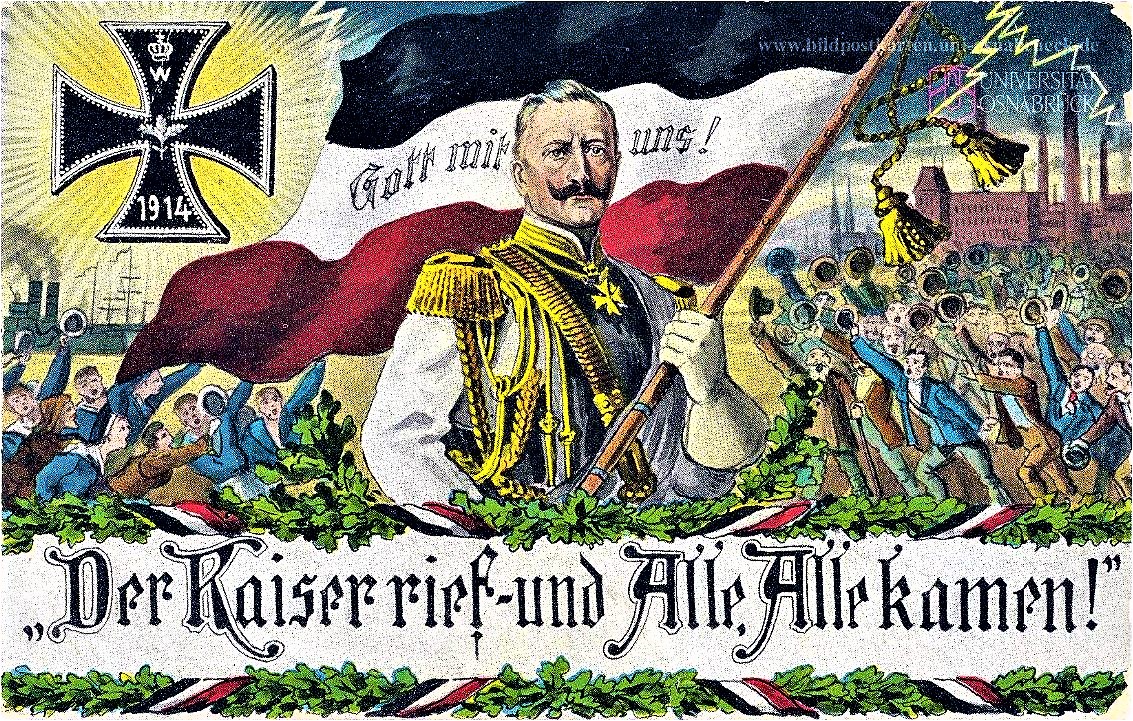Xenophobia and Nationalism
by Julius Podszun (2009) Gisela-Gymnasium, München/Germany on 2023-05-28

Written by: Julius Podszun (2009), Gisela-Gymnasium München/Germany, Agnese Corradini (2006), Liceo Sesto Properzio di Assisi/Italy, Lizzie Dawson (2004), Gisela-Gymnasium München/Germany & Alan Wöhler (2005), Gisela-Gymnasium München/Germany
Photo: German picture postcard from 1914. / Thanks to Deutsche Digitale Bibliothek
The following article was written as part of the trait d`union online workshop “The fight against discrimination and the discussion on how to” between editors from Liceo Sesto Properzio di Assisi/Italy and Gisela-Gymnasium Munich/Germany in March 2022.
Xenophobia and Nationalism
Definitions
a. Xenophobia means that people fear foreigners or people from other countries and cultures. And this often unfounded fear can lead to unfair discrimination.
b. Nationalism is the excessive self-esteem of one`s own nation. Nationalists think that other nations aren`t as important as their own.
The term Xenophobia comes from Greek and is made up of two words:
Xenos = stranger
Phobia = anxiety
It’s a negative attitude towards people who are perceived in a different way.
Where does Xenophobia come from?
According to psychologists and theorists this negative attitude against people or ethnic groups can be found in our genes. Our ancestors already had to deal with it, and so do we today. This behaviour can also be a consequence of harsh, strict education in combination with oppression and aggressiveness. Moreover, if you are unhappy with yourself and your life, you tend to hate and discriminate more against other people in order to feel better.
What encourages or causes this behavior?
● Education
● Political and economic environment
● Personal context
● Political position of individual countries
What can we do against it?
● Avoid bigotry and hate speech
● Stand up for harassed or discriminated people
● Talk about xenophobia and racism
● Consider other cultures and know more about them
Nationalism
Nationalism began between the 18th century and the 19th century with the American Declaration of Independence. In Europe, this current of thought, that led to the French Revolution in 1789 over the years, was mostly influenced by French authors such as Rousseau and Voltaire. During the 20th century WW1 and WW2 enhanced the feeling of nationalism, also with the contribution of politicians, diplomats and royals. Nationalist feelings were also prevalent in press reporting and popular culture. Not only literature, art and theater, but also the pages of many newspapers were filled with nationalist rhetoric and provocative stories, such as rumors about rival nations and their evil intentions.
In each country, nationalism developed in different forms and attitudes. This feeling was fuelled by a sense of historical destiny and, therefore, closely tied to the history and development of each nation.
In our century many nations see nationalism as a threat while others see it as an important boost to their own country`s power and influence. Many fanatics of this ideology generally think it’s important for societies with some historical and cultural coherence to maintain it, for example, by opposing mass immigration, and determining their policy in accordance with their own understanding of the welfare of their people.
This must not be confused with patriotism. Nationalism, doesn`t only refer to loyalty and devotion to a nation, but it also tends to imply the placing of that nation above others, a concept that differs from patriotism.
What can we do against discrimination?
● Support the victims of xenophobia and racism and talk about the problem
● More cultural support from governments to help citizens act against nationalism, discrimination, xenophobia. For example, schools should organize workshops and inform students about the problem, and let professionals come and talk about it in order to draw attention to that and explain.
● Not to be afraid to speak up against it
Our opinion
Through school activities and workshops people can surely learn to be more cautious and hopefully there will be less and less discrimination over the time. We also hope that the media, which play a big role in this whole situation, will draw more attention towards this important topic and that in the next few years people will overcome this problem, and will learn to respect each other.
Xenofobia e nazionalismo
Definizioni
a. Per Xenofobia si intende la paura verso gli stranieri o le persone di altri paesi e culture. E questa paura spesso infondata può portare a una discriminazione ingiusta.
b. Il nazionalismo è l`eccessiva autostima della propria nazione. I nazionalisti pensano che le altre nazioni non siano importanti quanto la loro.
Xenofobia
Il termine Xenofobia viene dal greco ed è composto da due parole:
Xenos = straniero,
Phobia = ansia
È un atteggiamento negativo verso le persone che sono percepite in modo diverso.
Da dove viene la xenofobia?
Secondo gli psicologi e i teorici questo atteggiamento negativo contro le persone o i gruppi etnici può essere trovato nei nostri geni. I nostri antenati hanno già avuto a che fare con esso, e lo stesso vale per noi oggi. Questo comportamento può anche essere una conseguenza di un`educazione dura e severa in combinazione con l`oppressione e l`aggressività. Inoltre, se sei infelice con te stesso e con la tua vita, tendi a odiare e discriminare di più le altre persone per sentirti meglio.
Cosa incoraggia o causa questo comportamento?
- L`educazione
- Ambiente politico ed economico
- Contesto personale
- Posizione politica dei singoli paesi
Cosa possiamo fare contro di esso?
- Evitare il bigottismo e i discorsi di odio
- Lottare per le persone molestate o discriminate
- Parlare di xenofobia e razzismo
- Considerare le altre culture e conoscerle meglio
Nazionalismo
Il nazionalismo iniziò tra il XVIII secolo e il XIX secolo con la Dichiarazione d`Indipendenza americana. In Europa, questa corrente di pensiero, che con gli anni portò alla Rivoluzione Francese del 1789, fu influenzata soprattutto da autori francesi come Rousseau e Voltaire. Durante il XX secolo, la prima e la seconda guerra mondiale aumentarono il sentimento di nazionalismo, anche con il contributo di politici, diplomatici e reali. I sentimenti nazionalisti erano anche prevalenti nella stampa e nella cultura popolare. Non solo la letteratura, l`arte e il teatro, ma anche le pagine di molti giornali erano piene di retorica nazionalista e storie provocatorie, come le voci sulle nazioni rivali e le loro cattive intenzioni.
In ogni paese, il nazionalismo si sviluppò in forme e atteggiamenti diversi. Questo sentimento era alimentato da un senso di destino storico e, quindi, strettamente legato alla storia e allo sviluppo di ogni nazione.
Nel nostro secolo molte nazioni vedono il nazionalismo come una minaccia, mentre altre lo vedono come una spinta importante per il potere e l`influenza del proprio paese. Molti fanatici di questa ideologia pensano generalmente che sia importante per le società con una certa coerenza storica e culturale mantenerla, per esempio, opponendosi all`immigrazione di massa, e determinando la loro politica in accordo con la propria concezione del benessere del loro popolo.
Questo non deve essere confuso con il patriottismo. Il nazionalismo non si riferisce solo alla lealtà e alla devozione verso una nazione, ma tende anche a implicare il porre quella nazione al di sopra delle altre, un concetto che differisce dal patriottismo.
Cosa possiamo fare contro la discriminazione?
- Sostenere le vittime della xenofobia e del razzismo e parlare del problema
- Più sostegno culturale da parte dei governi per aiutare i cittadini ad agire contro il nazionalismo, la discriminazione, la xenofobia. Per esempio, le scuole dovrebbero organizzare laboratori e informare gli studenti sul problema, e far venire dei professionisti a parlarne per richiamare l`attenzione su di esso e spiegare.
- Non avere paura ad esserne contrari
La nostra opinione
Attraverso le attività scolastiche e i workshop le persone possono sicuramente imparare ad essere più caute e si spera che con il tempo ci sia sempre meno discriminazione. Speriamo anche che i media, che giocano un ruolo importante in tutta questa situazione, richiamino più attenzione su questo importante argomento e che nei prossimi anni le persone superino questo problema e imparino a rispettarsi l`un l`altro.




